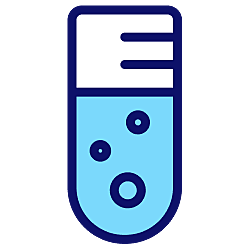





-
Syphilis is a sexually transmitted infection (STI) that you might get from having unprotected sex. You can test yourself at home with a syphilis test kit from ZAVA.
Our syphilis test kit contains 1 collection tube for your blood sample. You’ll take your own blood sample by using our simple pin prick lancets.



About the syphilis test kit
-
-
You should take a syphilis test if you think you’ve had unprotected sex with someone who has syphilis. You can also take the test if you’re not sure about the sexual health status of your sexual partner.
You can catch syphilis if your skin comes into contact with an infected ulcer or sore on someone else’s genitals. For example, during unprotected vaginal, anal or oral sex.
You cannot get syphilis from sharing clothes, cutlery, swimming pools or toilet seats.
You might have syphilis if you have any of the following symptoms:
- painless sores or ulcers on your genitals or around the anus
- blotchy rash on the palms of your hands or soles of your feet
- small skin growths on the vulva for women or around the anus for both men and women
The sores you get with syphilis are different to those in genital herpes. With syphilis, the sores are usually firm to touch and deeper in the skin. Genital herpes sores are more superficial. If you’re confused, you can speak to your sexual health clinic for more information.
You may also feel flu like symptoms shortly after contracting syphilis. This includes feeling fatigue, muscle aches and pains, fever and swollen glands.
Untreated syphilis can lead to serious health complications and long term problems. Syphilis can affect your entire body, including your nervous system, eyes, heart and bones.
If left untreated, the complications of syphilis can appear around 10 to 30 years after the initial infection.
If you are pregnant and think you might have syphilis, getting tested and treated immediately is even more important. Syphilis can be passed on to your baby and result in several complications. These include a low birth weight, premature delivery or stillborn birth.
Keep in mind that only condoms can protect you against sexually transmitted infections (STIs). Other methods of contraception cannot do this, like the birth control pill. You can still get syphilis if the condom does not cover the affected skin completely.
If you’re a woman and have not used any contraception while having sex, you may be at risk of pregnancy. If you do not wish to get pregnant, consider taking emergency contraception and using a regular form of contraception.
-
-
A syphilis test detects the sexually transmitted infection (STI) called syphilis. Syphilis is caused by the bacteria Treponema pallidum. Once you are infected, you might not get any symptoms until around 3 weeks after the infection.
The syphilis test will detect antibodies that your body makes in response to the syphilis infection. Antibodies are made by your immune system when a pathogen (virus or bacteria) gets into your body. The antibodies bind to the pathogen, which alerts other white blood cells to attack and get rid of the pathogen.
You can still have antibodies to syphilis even after you’ve been treated for the infection.
The only way to detect syphilis antibodies is in a blood sample. A swab sample, like in chlamydia tests, cannot detect antibodies.
-
-
To take a syphilis test make sure you wash your hands with warm, soapy water and dry them before and after testing. It’s easier to collect blood from warm hands. Our syphilis test kits come with everything you need to collect a blood sample.
It’s better to choose a finger from your non dominant hand (the one you do not write with) just in case your finger hurts after. You will need to:
- wipe your finger with an alcohol swab
- twist and pull the purple stick on a lancet
- place the lancet on your fingertip
- press down on the purple button
You should feel a sharp scratch on your finger. If this does not work, you can try again using a new lancet. Our test kits come with 3 lancets. After you’ve pricked your finger:
- a small drop of blood will form on your fingertip
- wipe the first drop away with a tissue
- hold your finger down towards the collection tube
- massage and gently squeeze your finger to allow blood to fall into the tube
- fill the tube up to the upper line
If your finger stops bleeding before you can fill the tube, you can prick it again with another lancet.
Once your sample is complete, screw the lid back on securely. You can put a plaster on your finger if it is still bleeding.
Fill out the label with your details and affix it to the sample tube. It’s important to have the label attached to the sample so that the lab can process it correctly.
Place the tube inside the protective wallet and the wallet inside the prepaid envelope. You can now post your sample from any UK post box.
-
-
You should take the syphilis test around 3 to 6 weeks after you think you’ve been infected. If you do the test before this, you may get a false negative result. This is because the bacteria has not reproduced enough for the test to detect.
You may also want to do a second syphilis test 3 months after the first test, even if you get a negative result. It can take up to 3 months for syphilis to show on a test, but most cases are detected in the first test.
-
-
Whatever your test result is, our doctors will always guide you on the next steps to take.
You will either get a negative test result or a positive test result.
If you get a negative result, this means you do not have syphilis. You may consider getting retested a few months later as the infection might not have shown up on the first test. You should continue to practice safe sex and use a condom.
If you get a positive result, this means you have syphilis. You’ll need to speak to your doctor or sexual health clinic to arrange for treatment. You should also let any recent sexual partners know that you have tested positive so that they can get tested.
Treatment for syphilis involves an antibiotic injection. You’ll need 3 injections to complete the full course. If you cannot have the injection, you may be given a long course of oral antibiotics. It’s important to complete the entire course of antibiotics to make sure the infection is completely treated.
If you get treated for syphilis, you’ll need to avoid having sex for at least 2 weeks after your treatment has finished.
If you think you still have an STI infection but have tested negative for syphilis, consider taking another STI test. At ZAVA, we offer a range of home STI tests, including a dual chlamydia and gonorrhoea test and a HIV test kit.
-
-
The accuracy of the syphilis test depends on how long you’ve been infected. If you test too early, you may get a false negative result.
Most syphilis tests are around 80 to 90% accurate. We encourage you to get tested again around 3 months after infection to confirm your sexually transmitted infection (STI) status.

Dr Babak Ashrafi Clinical Lead for Service Expansion
Accreditations: BSc, MBBS, MRCGP (2008)
Babak studied medicine at King’s College London and graduated in 2003, having also gained a bachelor’s degree in Physiology during his time there. He completed his general practice (GP) training in East London, where he worked for a number of years as a partner at a large inner-city GP practice. He completed the Royal College of GPs membership exam in 2007.
Meet our doctorsLast reviewed: 05 May 2022
-
Syphilis (NHS) [Feb 2019] [accessed March 2022]
-
Syphilis - STD factsheet (CDC) [Feb 2022] [accessed March 2022]
-
Syphilis Testing (STD Center NY) [accessed March 2022]








